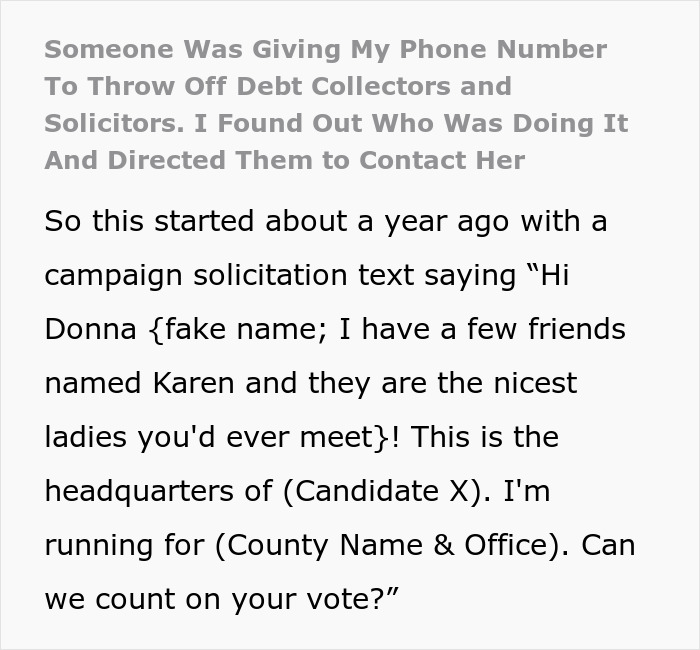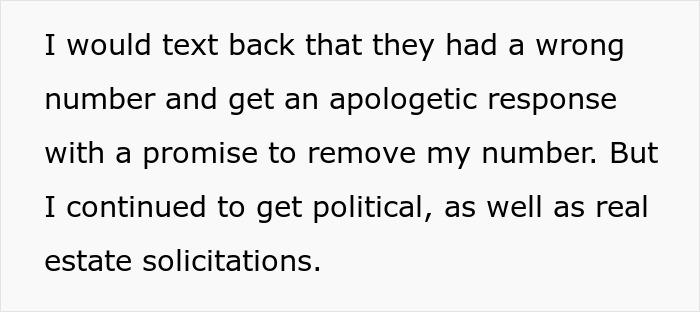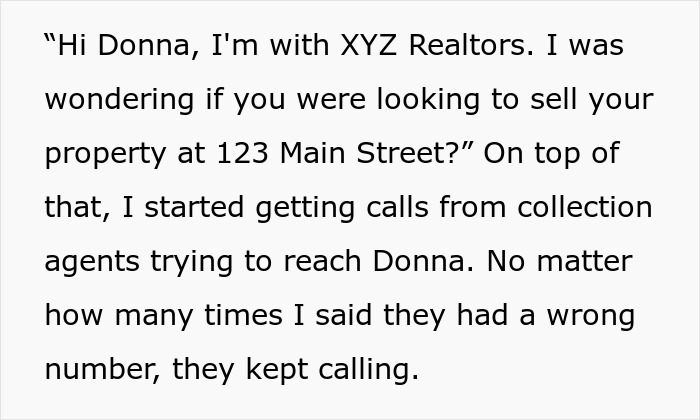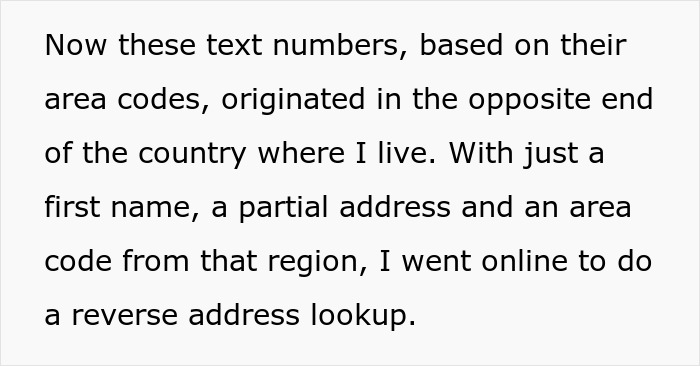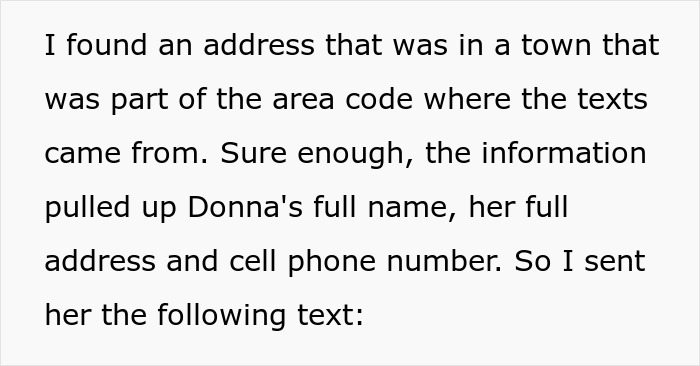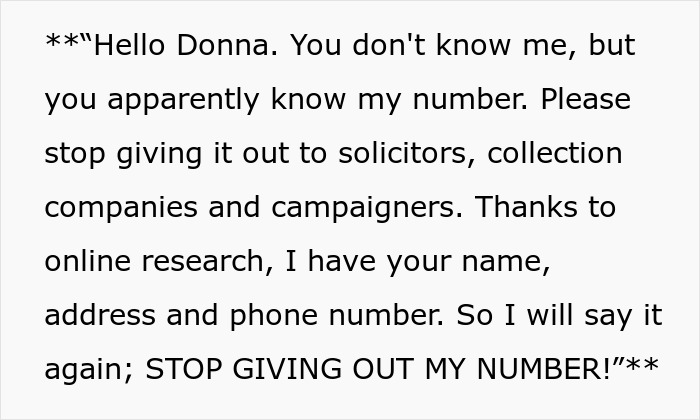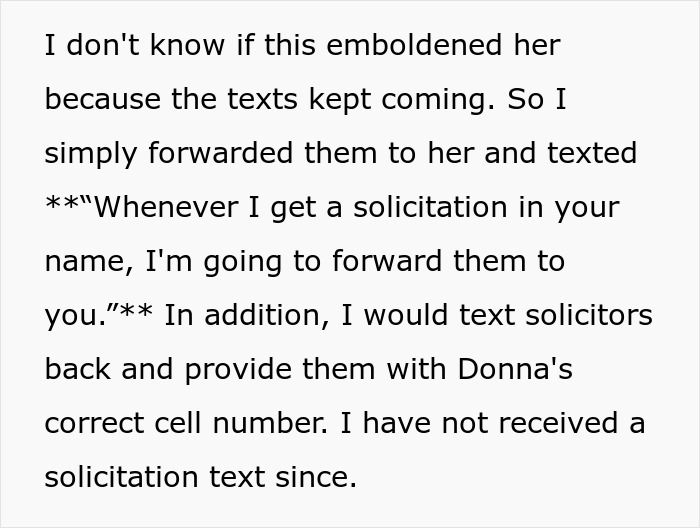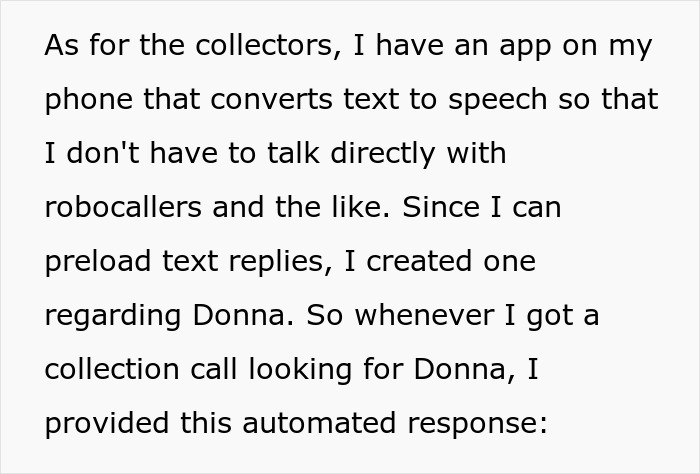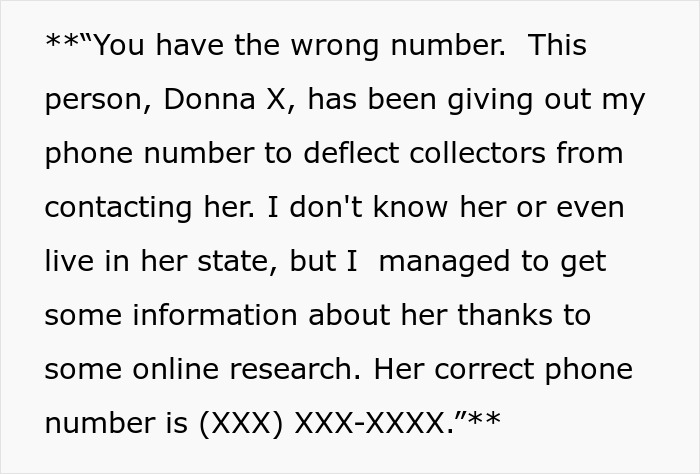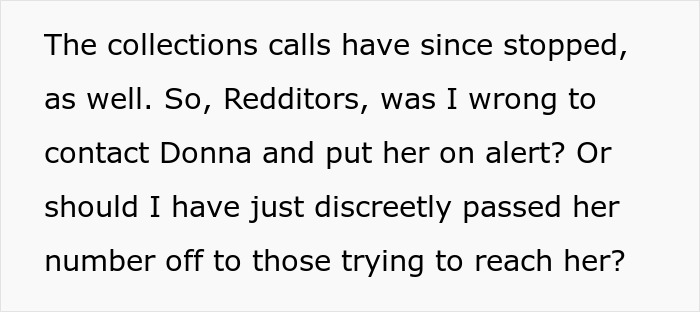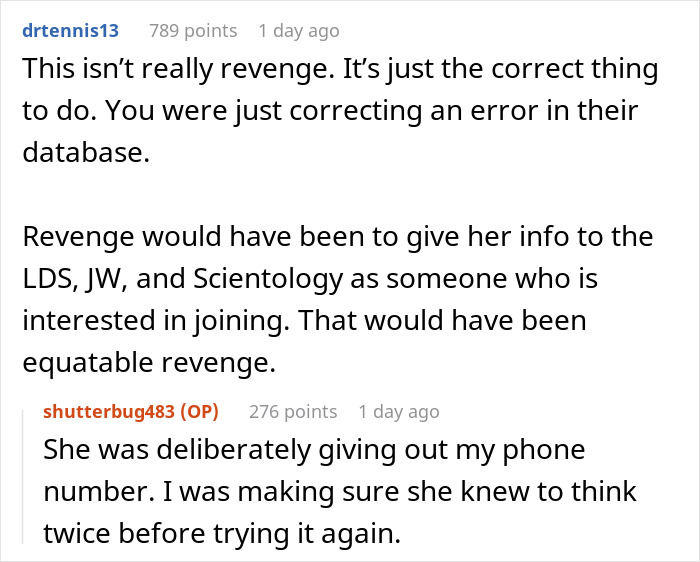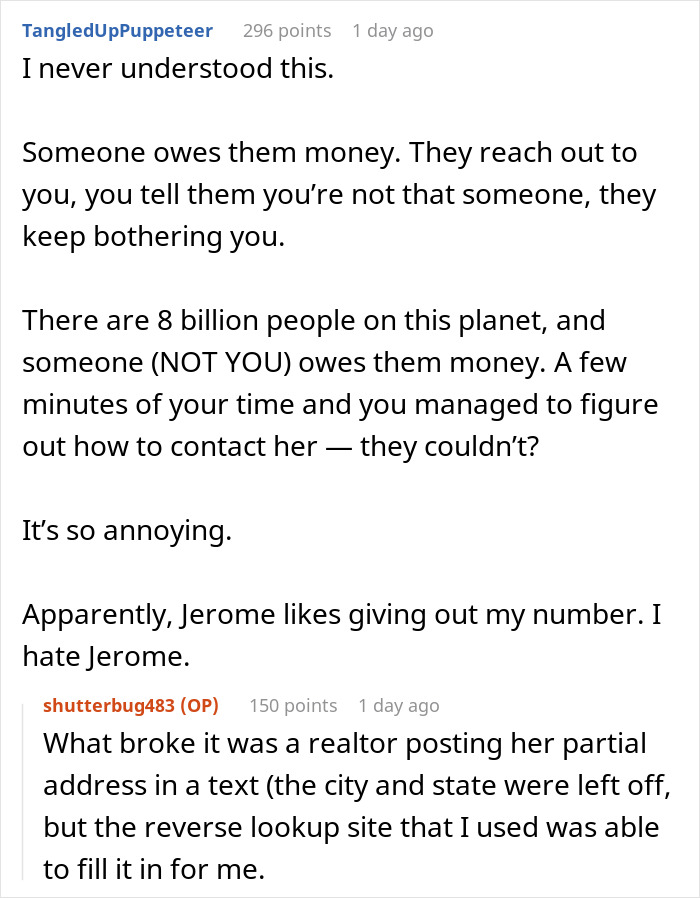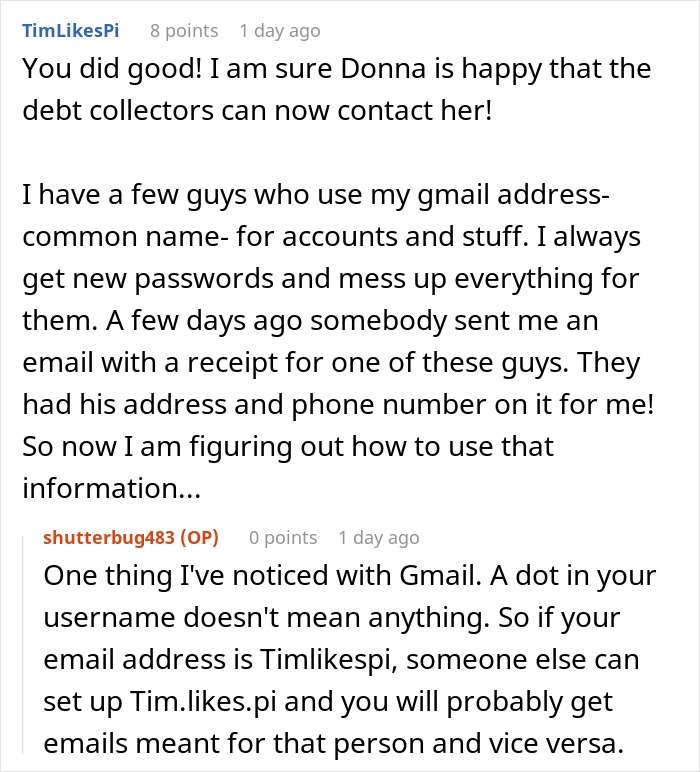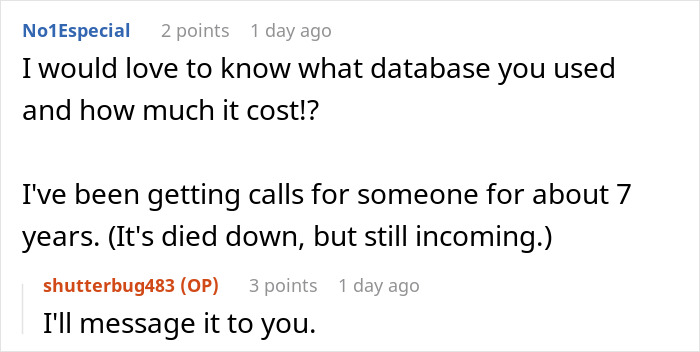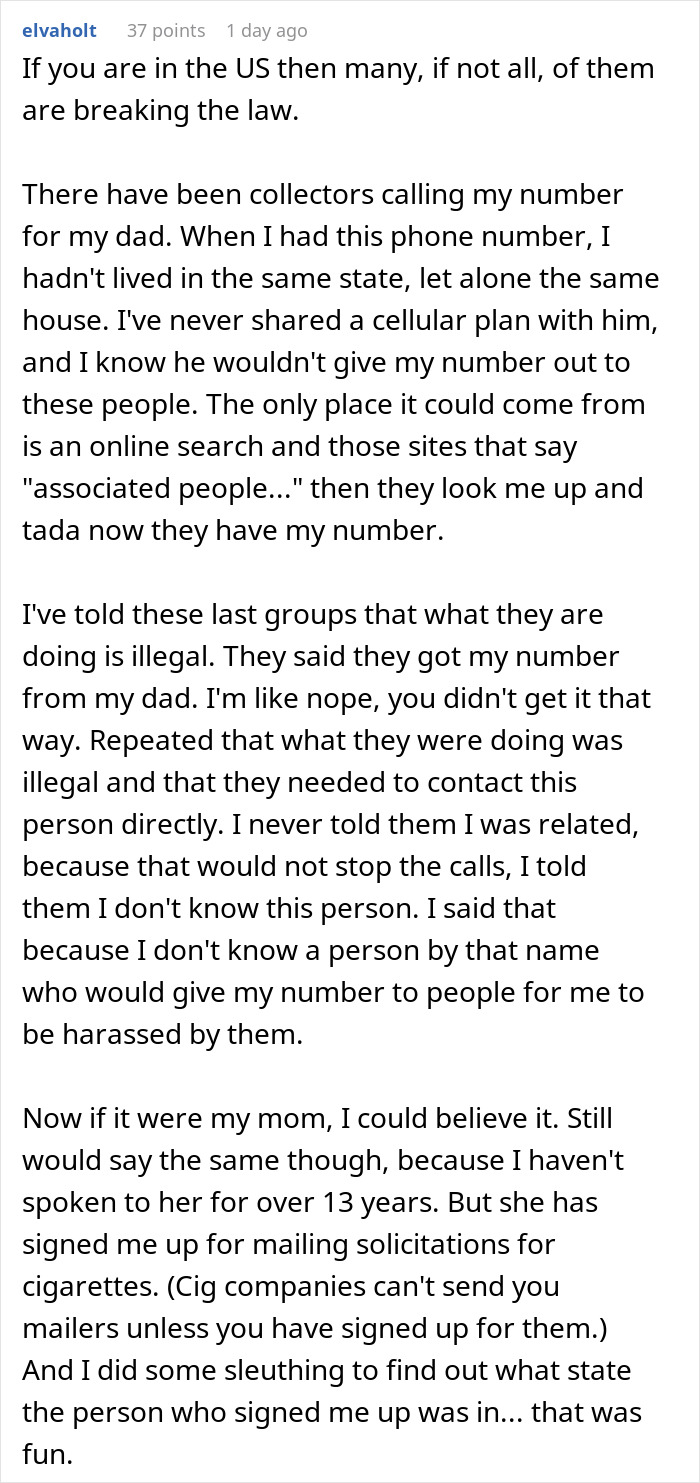Well, a woman named ‘Donna,’ mentioned in our today’s story from the user u/shutterbug483, also gave debt collectors a ‘bogus’ number. But she was unlucky – because the number turned out to be real, and all this later only led to the consequence that the cunning plan completely failed. However, let’s not get ahead of things… More info: Reddit
The author of the post started getting dubious solicitations and debt collectors’ calls around a year ago
Share icon Image credits: Alex Green (not the actual photo)
The addressee was some random Donna living in another part of the country
Image credits: shutterbug483 Share icon Image credits: Christina Morillo (not the actual photo)
The author tried to politely stop these wrong calls and emails at first, but to no avail
Image credits: shutterbug483 Share icon Image credits: Pixabay (not the actual photo)
So they just found out Donna’s actual address, phone number and last name – and gave it out to all the solicitors
Image credits: shutterbug483
Only after this, as the author admits, it all ended for them. And it all only started for Donna, we presume…
So, for the Original Poster (OP), it all started about a year ago with a campaign solicitation text, addressed to a certain ‘Donna’ and urging them to vote for a certain candidate for county office. Is it worth mentioning that the author is not Donna at all and actually lives in another part of the country? At first, the author honestly tried to point out to the solicitors their mistake, but let’s be honest – who has ever succeeded in doing so? It didn’t work out for the OP either. And then they were joined by debt collectors, looking for the same flippant Donna, and the original poster’s mood began to deteriorate exponentially. And here we must really pay tribute to the author – many people here would simply ride it out with the annoying recipients or set up anti-spam filters. But the author is obviously a creative and inquisitive person, so they were not too lazy to find a website, with the help of which, and the available information, they figured out not only where Donna lives, but also her phone number, first and last name. After this, the author made another (probably naive) attempt to refrain from taking critical steps. They wrote to Donna, explained the situation and politely asked her to stop giving out their number. Now try to guess Donna’s reaction? That’s right – there was no reaction. Now the author sincerely believed that their hands were free and their conscience was clear, and all subsequent texts from debt collectors, solicitors, real estate agents and other decent respectable people received an automatic response explaining that the OP was not Donna. But at this address and at this phone number, they could easily find the proper Donna they were looking for. It was a damn good move – at least the author admits that after that, the texts and emails completely stopped. Although, of course, now I just wonder how it all ended for Donna? And did it end at all? Share icon Image credits: Karolina Kaboompics (not the actual photo) Well, before the advent of mobile phones and instant messengers, it was way easier to deal with annoying solicitors – for example, using some good old-fashioned ‘No Soliciting’ or ‘No Unauthorized Agents’ signs. Now, unwanted interlocutors have become much more active, and the variability in their choice of means is truly impressive. As a last resort, as this article on the Federal Trade Commission official website notes, for example, you can use The National Do Not Call Registry. However, this isn’t a panacea either. “The Do Not Call Registry stops unwanted sales calls – live calls or robocalls – from real companies that follow the law. The Registry is a list that tells registered telemarketers what numbers not to call – it doesn’t block calls,” the FTC Consumer Advice resource claims. “So being on the Registry won’t stop calls from scammers making illegal calls.” Well, debt collectors could well consider the messages from the original poster to be nothing more than another trick by the cunning Donna to avoid communicating with them. So indeed, the author looks absolutely reasonable here. And what, I wonder, do the commenters on the original post think about this? Well, some responders actually believe that the author’s reaction is not revenge per se at all. “This isn’t really revenge. It’s just the correct thing to do. You were just correcting an error in their database,” one person wrote in the comments. “You did good! I am sure Donna is happy that the debt collectors can now contact her!” another one noted sarcastically. And some commenters are sincerely perplexed why the debt collectors do not show flexibility and ingenuity in their work. “I never understood this. Someone owes them money. They reach out to you, you tell them you’re not that someone, they keep bothering you,” some commenter pondered. “There are 8 billion people on this planet, and someone (NOT YOU) owes them money. A few minutes of your time and you managed to figure out how to contact her – they couldn’t? It’s so annoying.” However, it is not given to us to change at least something in the colossal and soulless machine of spammers around the world, the mechanism of which has been developing over years and decades. So all that remains for us is to defend our rights. As, for example, the author of the post did. And do you, our dear readers, agree with them in doing so? Please express your thoughts in the comments below.
People in the comments sided with the author, claiming that this wasn’t even petty revenge – just correcting the information
Anyone can write on Bored Panda. Start writing! Follow Bored Panda on Google News! Follow us on Flipboard.com/@boredpanda!

